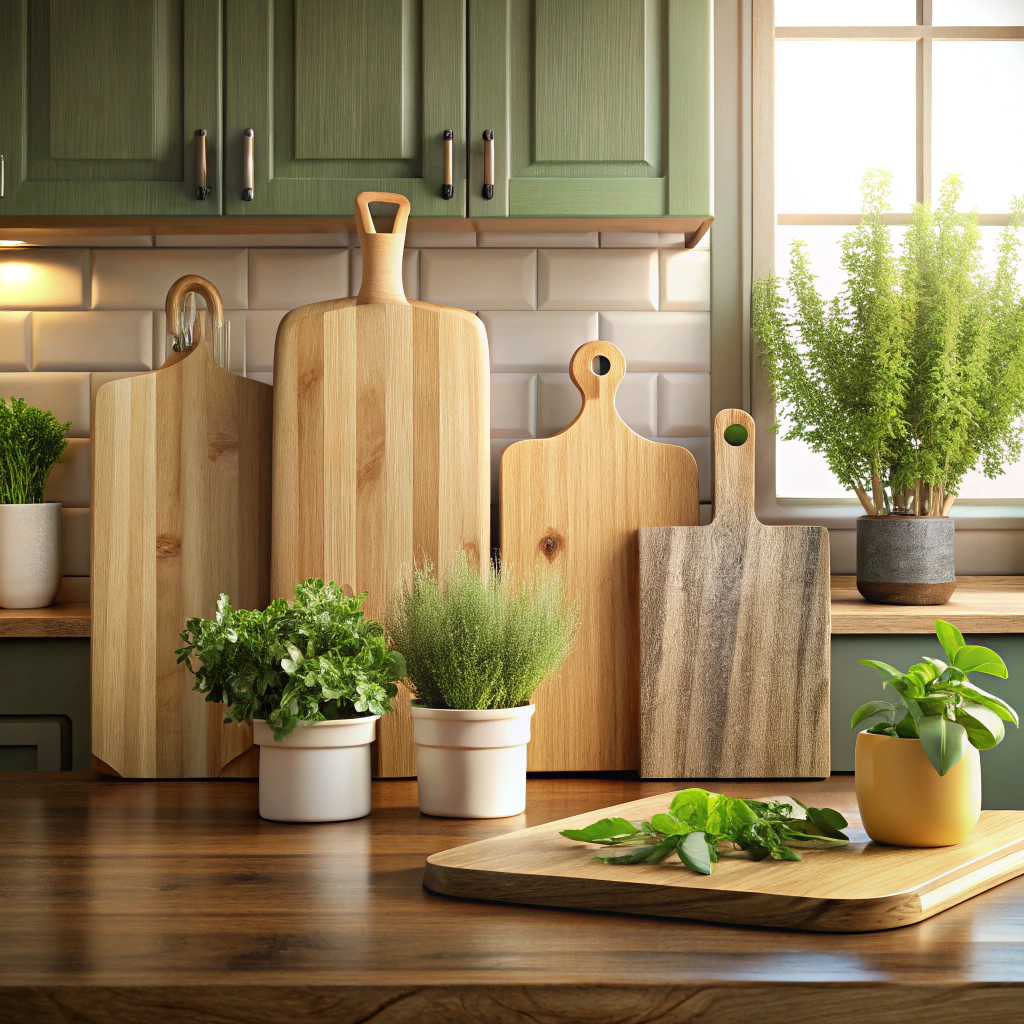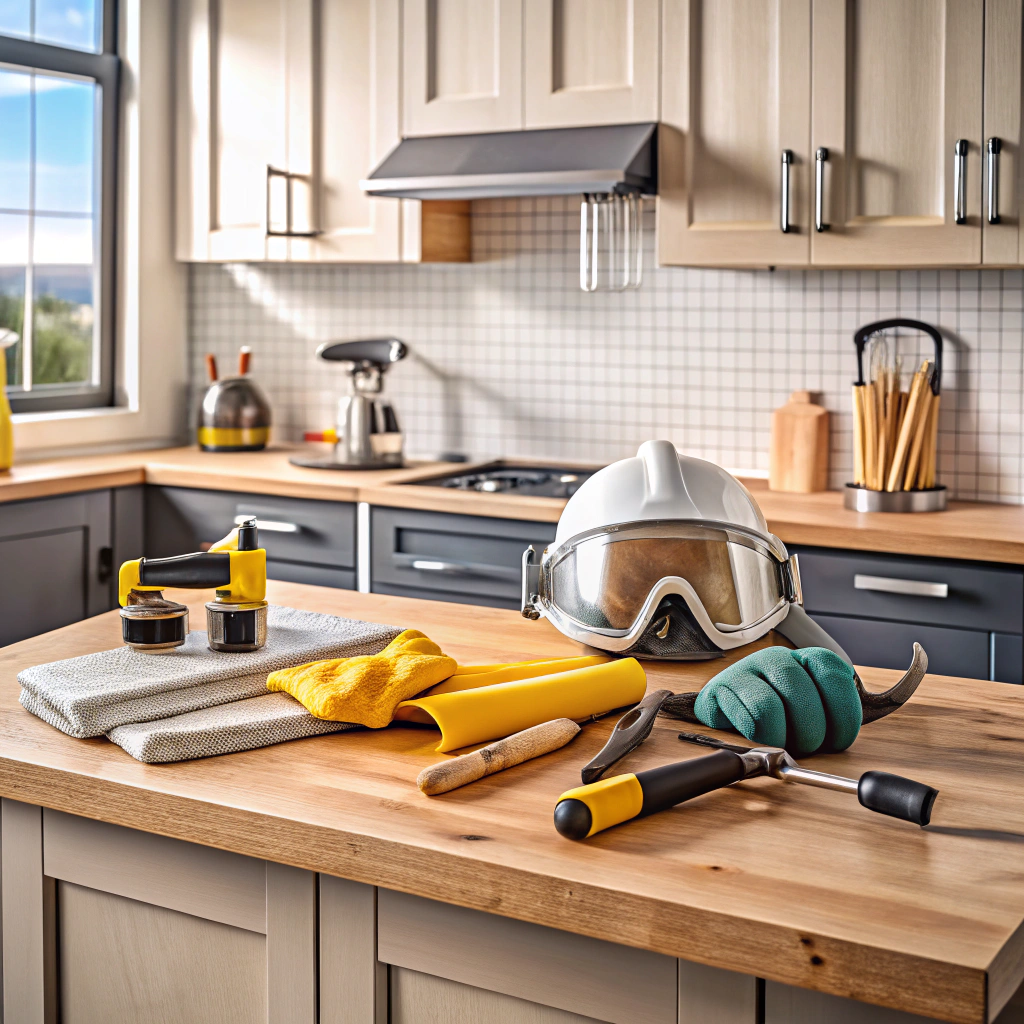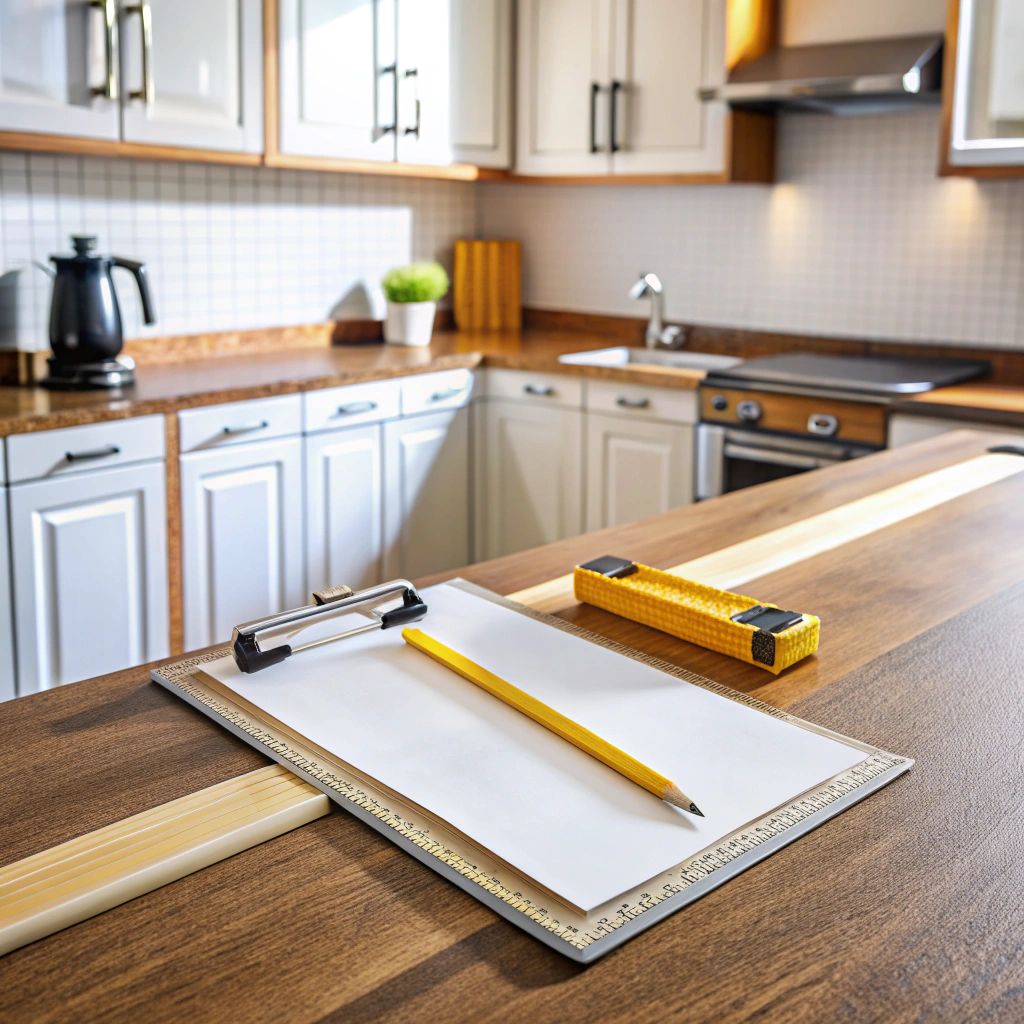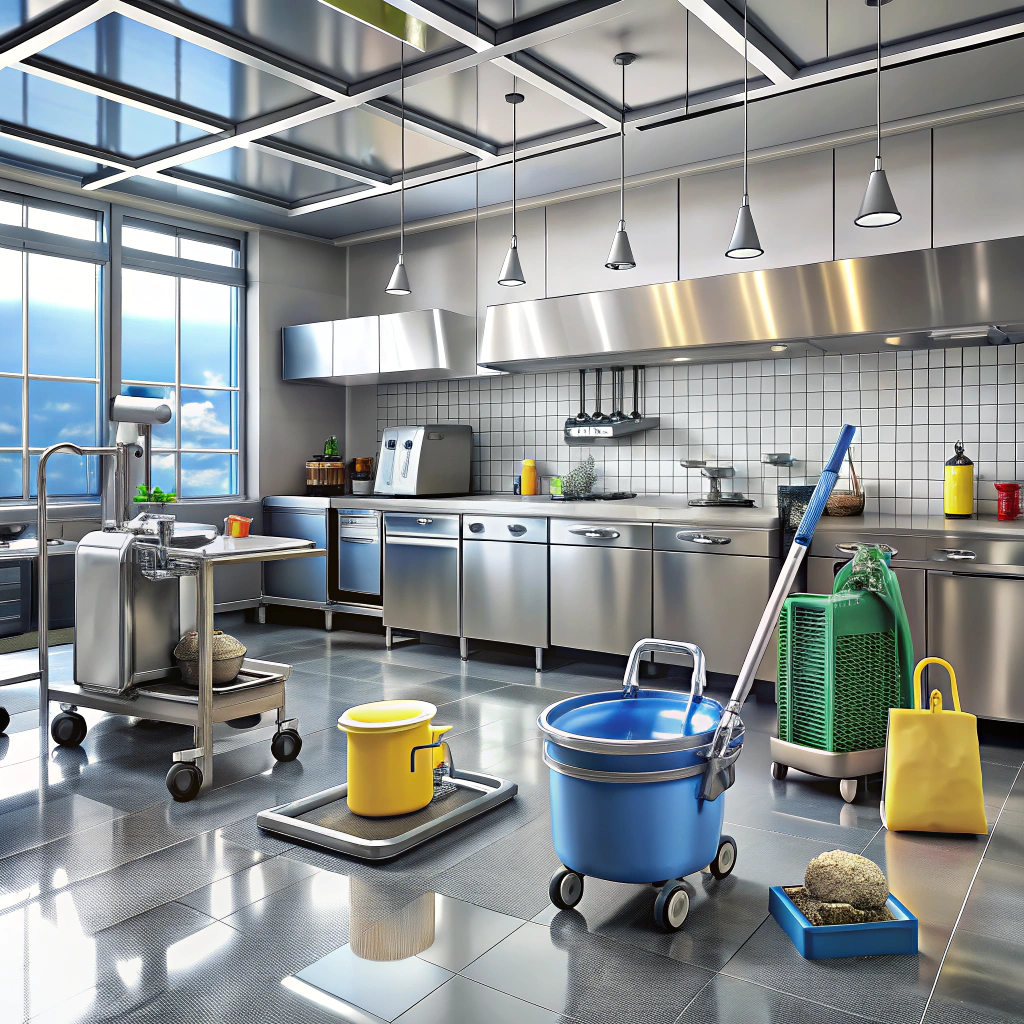Last updated on
Discover the possibilities of using floor tile for kitchen countertops and transform your cooking space with style and durability.
Are you tired of your old kitchen countertops and looking for a budget-friendly upgrade? Have you considered using floor tiles as an alternative to expensive countertop materials? Yes, you read that right – floor tiles can be used for kitchen countertops! But before you start ripping up your floors, let’s dive into the pros and cons of this unconventional approach. In this article, we’ll explore whether or not using floor tiles for kitchen countertops is a viable option, how to install them properly, and some stylish design ideas to inspire your next home renovation project.
So grab a cup of coffee and let’s get started!
Key takeaways:
- Floor tiles can be used for kitchen countertops.
- Ceramic tiles are affordable and versatile for countertop use.
- Porcelain tiles are highly resistant to stains and bacteria growth.
- Natural stone tiles like granite or marble add an elegant touch but require more maintenance.
- Glass tiles provide a modern look but may not be suitable for hot items.
What's Inside
Types of Floor Tiles Suitable for Countertops
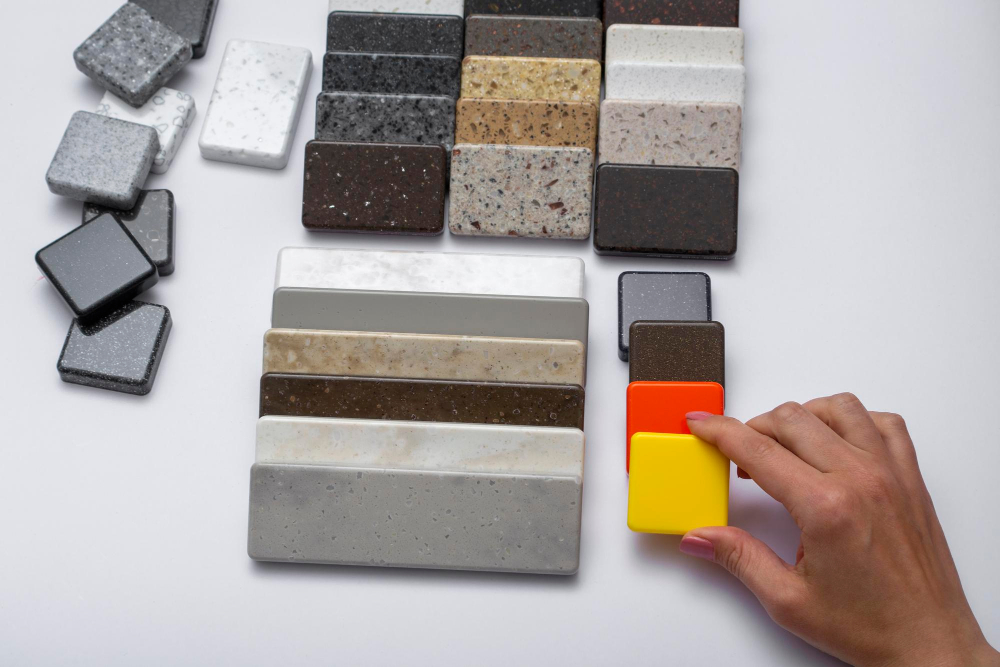
When it comes to using floor tiles for kitchen countertops, not all tile types are created equal. Some tiles may be too porous or brittle to withstand the daily wear and tear of a busy kitchen.
Therefore, it’s essential to choose the right type of tile that is both durable and functional.
Ceramic tiles are one popular option for countertop use due to their affordability and versatility in design options. They come in various colors, patterns, shapes, sizes that can mimic natural stone or even wood grain textures.
Porcelain tiles are another excellent choice as they have low water absorption rates making them highly resistant against stains and bacteria growth. They also offer a wide range of styles from matte finishes with subtle veining patterns resembling marble or glossy surfaces with bold geometric designs.
Natural stone such as granite or marble can add an elegant touch but require more maintenance than other materials due to their susceptibility towards scratches and etching from acidic substances like lemon juice.
Glass Tiles provide a modern look while being easy-to-clean surface material; however they might not be suitable if you frequently place hot pots on your counters since glass has poor heat resistance properties compared with other materials mentioned above.
Choosing the Right Tile Material
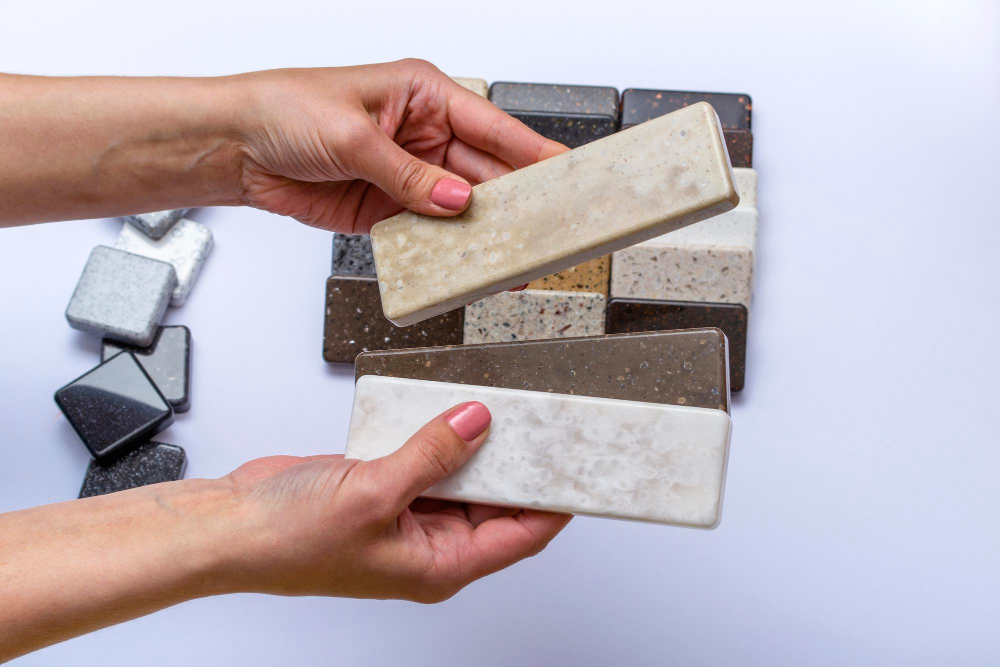
The first thing you need to decide is what type of look and feel you want in your kitchen. Do you prefer a natural stone aesthetic or a sleek modern finish? Once you have determined the style, then it’s time to think about practicality.
Ceramic tiles are an affordable option that come in various colors and patterns but may not be as durable as other materials. Porcelain tiles offer more durability than ceramic but can be more expensive due to their manufacturing process.
Natural stone tiles such as granite or marble provide a luxurious look with unique veining patterns, but they require regular sealing and maintenance due to their porous nature. Glass tiles offer endless design possibilities with their translucent appearance, making them ideal for contemporary kitchens.
Consider how much heat exposure your countertops will endure before selecting any tile material; some types of floor tile may crack under high temperatures from hot pots or pans placed on them frequently.
Ceramic Tiles
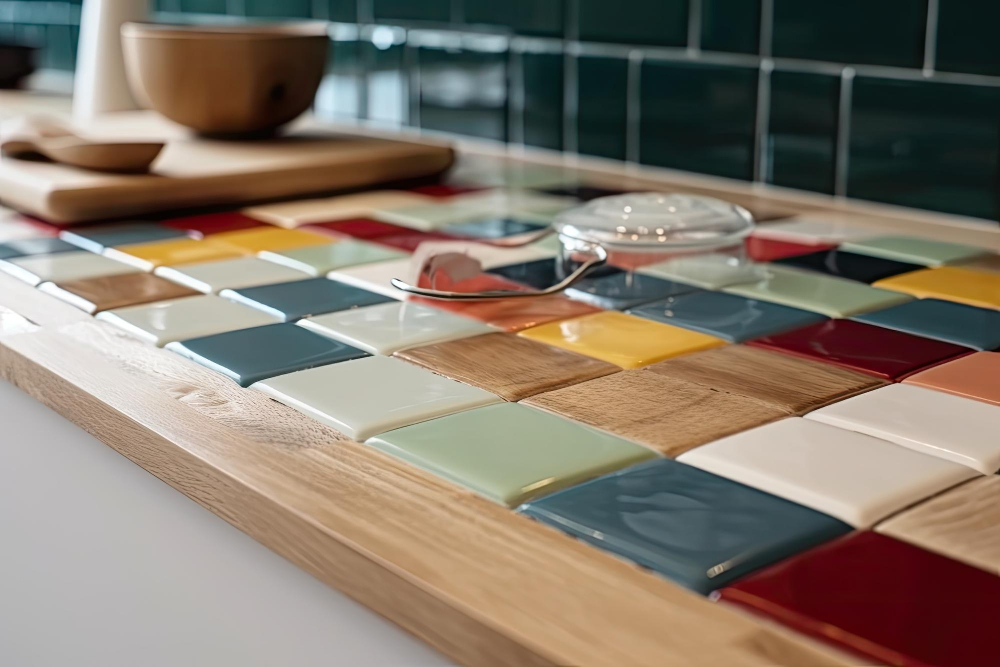
They come in various colors, patterns, and sizes that can complement any kitchen design. Ceramic tiles are made from clay that is fired at high temperatures to create a hard surface that is resistant to scratches, stains, and heat.
One of the advantages of ceramic tile countertops is their low maintenance requirements. They can be easily cleaned with soap and water or mild household cleaners without damaging the surface.
However, it’s important to note that ceramic tiles have some limitations when it comes to durability compared with other materials like natural stone or porcelain.
Another consideration when using ceramic tile for your countertop is its susceptibility to chipping or cracking if heavy objects fall on them. It’s also essential not only choosing the right type of grout but also sealing it properly since unsealed grout lines may absorb moisture leading up mold growth over time.
Porcelain Tiles
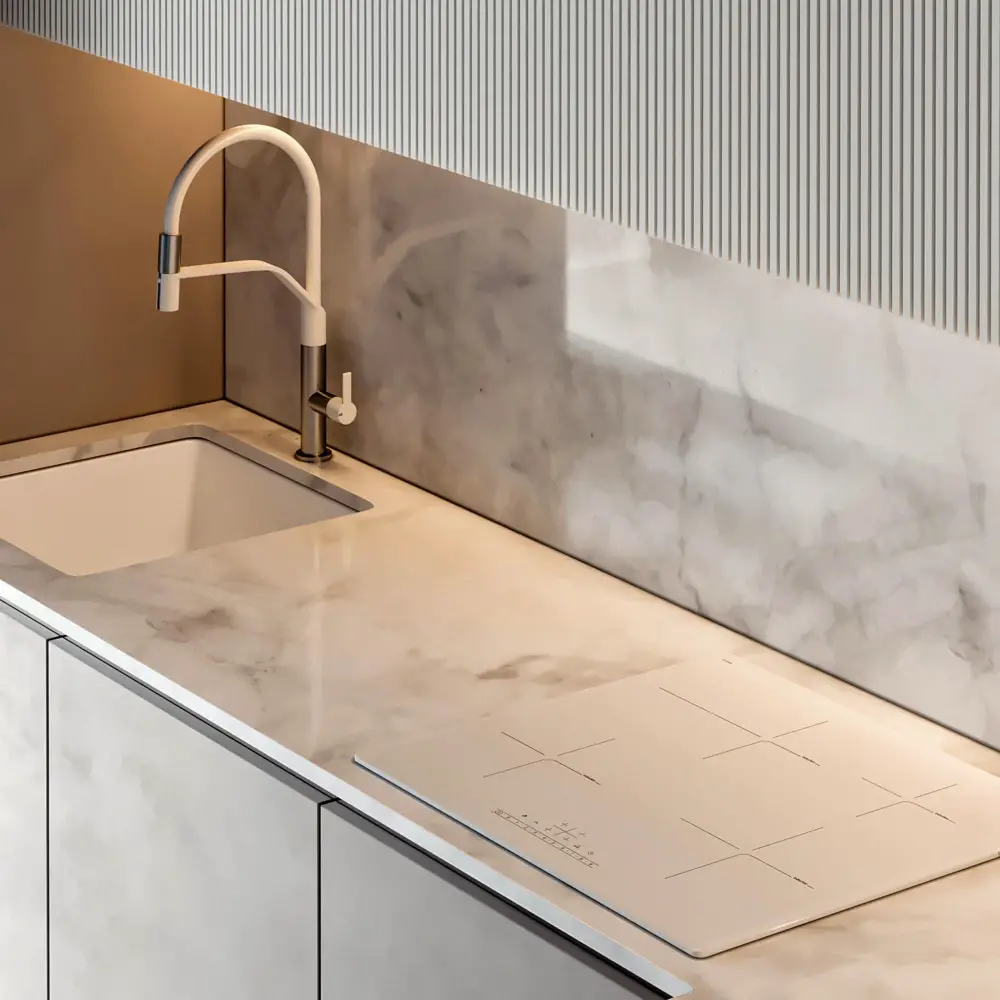
They are made from a mixture of clay, feldspar, and other natural materials that are fired at high temperatures to create a dense, hard-wearing surface. Porcelain tiles come in various sizes, colors, patterns and finishes that can mimic the look of natural stone or wood.
One advantage of using porcelain tiles for kitchen countertops is their heat resistance properties. They can withstand high temperatures without cracking or discoloring which makes them ideal for cooking areas where hot pots and pans may be placed on the countertop.
Another benefit is their non-porous nature which means they do not absorb liquids easily making them resistant to stains caused by spills such as wine or coffee. This also makes cleaning up messes easier since you don’t have to worry about bacteria seeping into cracks like with some other materials.
However, one downside of porcelain tile countertops is that they may chip if heavy objects fall onto them causing damage that cannot be repaired easily like with granite or quartz surfaces.
Natural Stone Tiles
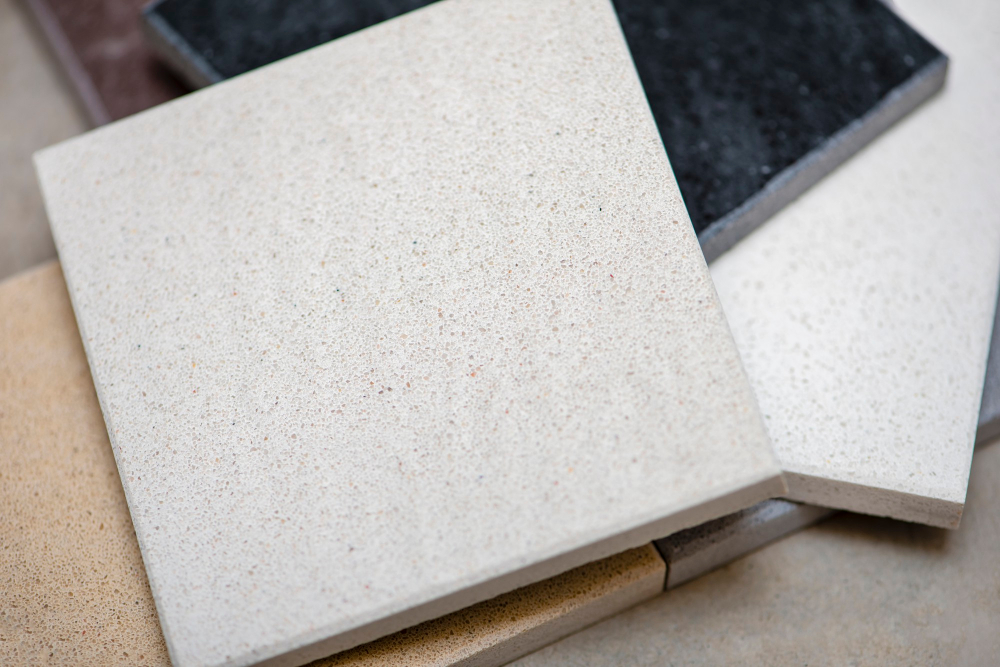
They come in various types such as granite, marble, limestone, travertine and slate. Each type has its unique characteristics that can add depth to your kitchen design.
Granite is one of the most popular choices due to its durability and heat resistance properties. It’s also available in many colors ranging from light beige to dark black.
Marble is another classic option that exudes elegance with its veined patterns but requires more maintenance than other stones since it’s prone to scratches and stains.
Limestone offers a softer look with muted tones but isn’t recommended for high traffic areas because it can be easily scratched or chipped.
Travertine has a rustic appearance with pitted holes on the surface which gives it character but needs regular sealing since it’s porous by nature.
Slate provides an earthy feel with textured surfaces that hide dirt well while being durable enough not to chip or scratch easily. When choosing natural stone tiles as your countertop material make sure they’re sealed properly before installation so they won’t absorb liquids or food particles over time causing discoloration or bacteria growth.
Glass Tiles

They offer a sleek and modern look that can elevate the overall design of your kitchen. Glass tiles come in various colors, shapes, and sizes, making it easy to customize your countertop according to your style preference.
One advantage of glass tiles is their heat resistance properties. They can withstand high temperatures without cracking or discoloring like some other materials might do over time.
However, they are not as durable as natural stone or porcelain tiles and may be prone to chipping if heavy objects fall on them.
Another consideration with glass tile countertops is their susceptibility to stains and scratches due to their smooth surface texture. It’s important always to use cutting boards when preparing food on these surfaces since knives could easily scratch them.
When it comes down cost-wise compared with other materials such as granite or quartzite; glass tile falls somewhere in between ceramic/porcelain options but still less expensive than natural stones like marble.
Pros and Cons of Using Floor Tile for Countertops
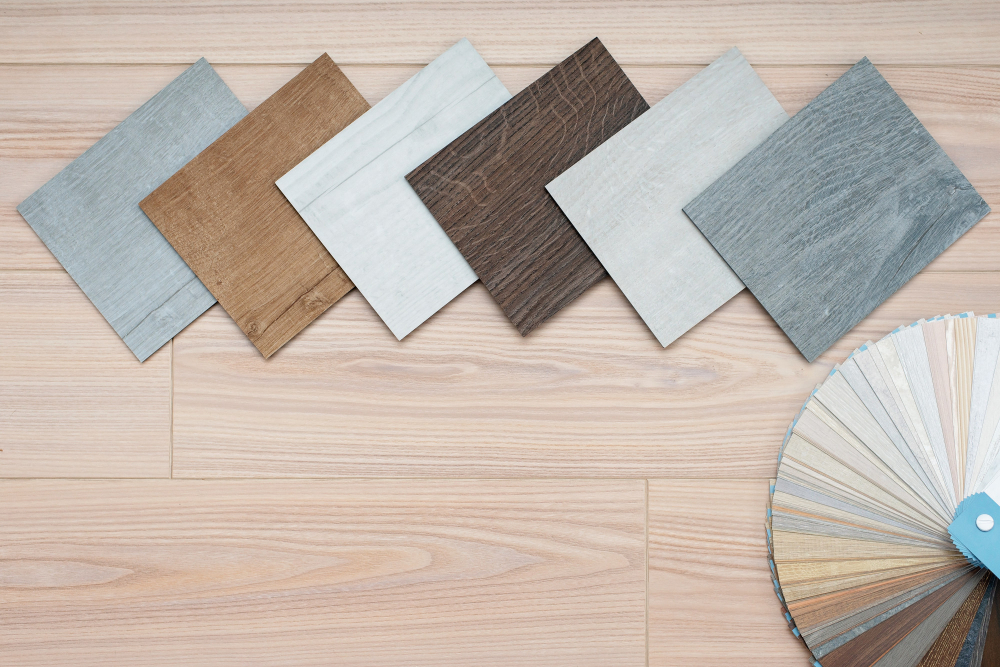
Let’s take a closer look at the pros and cons of this unconventional approach.
Pros:
- Cost-effective: Floor tiles are generally less expensive than traditional countertop materials such as granite or quartz.
- Variety of options: There is a wide range of tile colors, patterns, and textures available to suit any design preference.
- Easy installation: With some basic DIY skills, you can install floor tile countertops yourself without hiring professionals.
- Heat-resistant: Most types of floor tiles are heat-resistant which makes them ideal for use in the kitchen.
Cons:
- Uneven surface issues: Unlike traditional countertop materials that have smooth surfaces, tiled countertops may have uneven surfaces due to grout lines between each tile. This can make it difficult to roll out dough or place items on the counter without wobbling.
- Susceptible to stains and bacteria growths if not sealed properly
- Durability concerns – Tiles may crack under heavy impact
- Overall using floor tiles as an alternative material for your kitchen counters is worth considering but it’s important that you weigh up both sides before making your final decision.
Heat Resistance of Different Tile Types

You don’t want your beautiful new countertop to crack or discolor due to exposure from hot pots and pans. The good news is that some types of floor tiles are highly resistant to heat, making them an excellent choice for kitchen countertops.
Ceramic tiles are known for their ability to withstand high temperatures without cracking or fading. Porcelain tiles also have excellent heat resistance properties and can handle extreme temperature changes without damage.
Natural stone tiles like granite and marble may be less resistant than ceramic or porcelain but still offer decent protection against heat if sealed properly. Glass tile, on the other hand, has low thermal conductivity which makes it more susceptible than other materials when exposed directly with high temperatures.
Durability Concerns
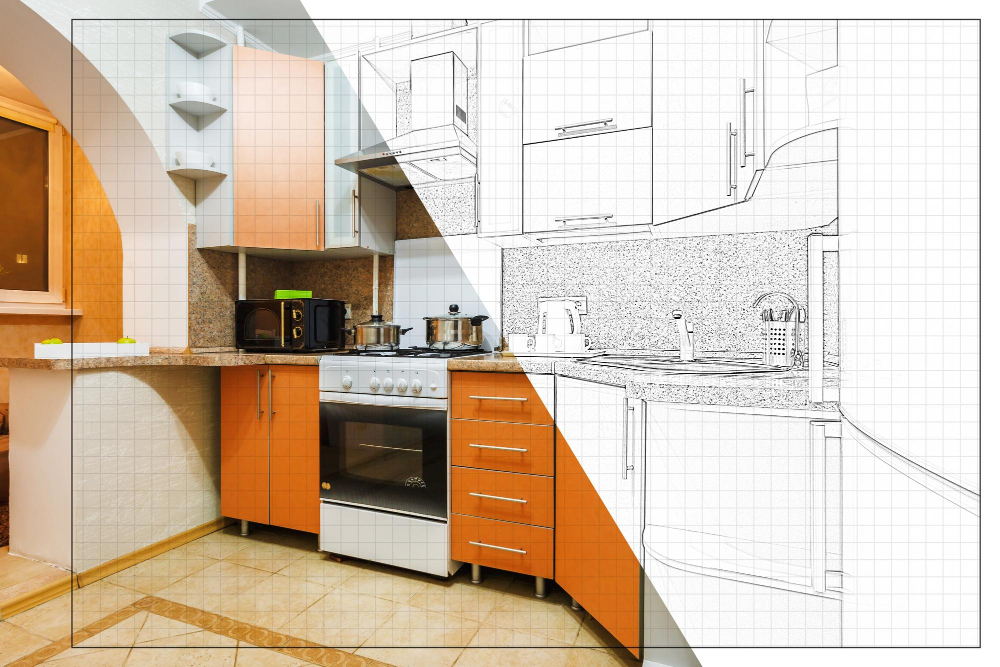
While floor tiles are known for their strength and resilience, using them as a countertop material can pose some concerns. One of the main issues with floor tile countertops is that they may not be able to withstand heavy impacts or weighty objects dropped on them.
This can cause cracks or chips in the tiles, which could lead to further damage over time.
Another concern with using floor tile for kitchen countertops is that they may not be able to handle extreme temperature changes very well. If you frequently place hot pots and pans directly onto your countertop surface without protection, this could cause thermal shock and result in cracking or warping of the tiles.
However, these durability concerns can largely depend on the type of tile material used as well as how it’s installed and maintained over time. By choosing high-quality materials like porcelain or natural stone tiles and ensuring proper installation by an experienced professional contractor, you can minimize these risks significantly.
Susceptible to Stains and Bacteria

The grout lines between the tiles can easily trap dirt, food particles, and moisture which can lead to bacterial growth over time. Certain types of tile materials such as natural stone may require sealing periodically in order to prevent staining from acidic substances like lemon juice or vinegar.
To avoid these issues with your floor tile countertops it is important that you clean them regularly using mild soap and water or a pH-neutral cleaner specifically designed for use on tiled surfaces. Avoid using abrasive cleaners or scrubbers that could damage the surface of the tiles.
Another way to minimize staining is by choosing darker colored tiles with less porous surfaces such as porcelain instead of lighter-colored ceramic options which tend to absorb more liquids.
Uneven Surface Issues
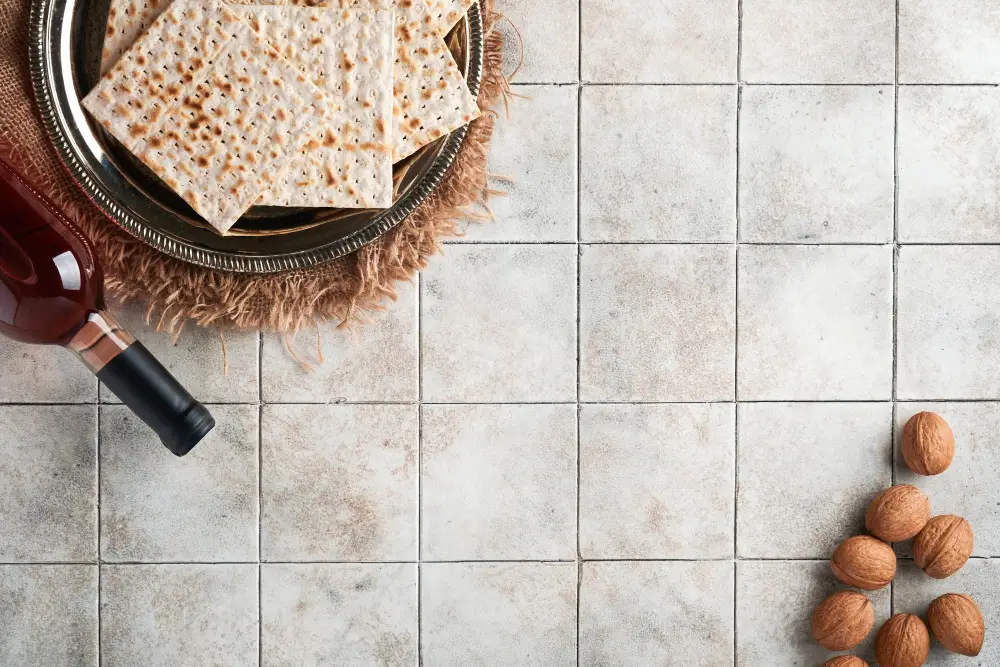
Unlike traditional countertop materials, such as granite or quartz, floor tiles are not perfectly flat and can have slight variations in thickness. This can lead to an uneven surface that may be difficult to work on and could cause items placed on it to wobble or even fall over.
To avoid this issue, it’s important to choose high-quality tiles with a consistent thickness throughout. Proper installation techniques must be followed by ensuring that the substrate underneath is levelled before laying down any tile.
If you’re considering using larger format tiles for your countertops, keep in mind that they may require additional support due to their weight and size. It’s best practice always to consult with a professional installer who has experience working with unconventional countertop materials like floor tile.
Cost Analysis of Floor Tile Countertops

Using floor tiles for kitchen countertops can be an affordable option compared to other materials like granite or quartz. The price of floor tiles varies depending on the type and quality of the material you choose.
Ceramic and porcelain tiles are generally less expensive than natural stone or glass tiles.
In addition to the cost of materials, you should also factor in installation costs if you’re not planning on doing it yourself. Professional installation can add up quickly, so make sure to get quotes from multiple contractors before making a decision.
Another advantage of using floor tile for countertops is that they are easy to replace if damaged or stained over time without having to redo your entire countertop surface as with other materials such as granite which require professional help when replacing them.
Cost-effective Option
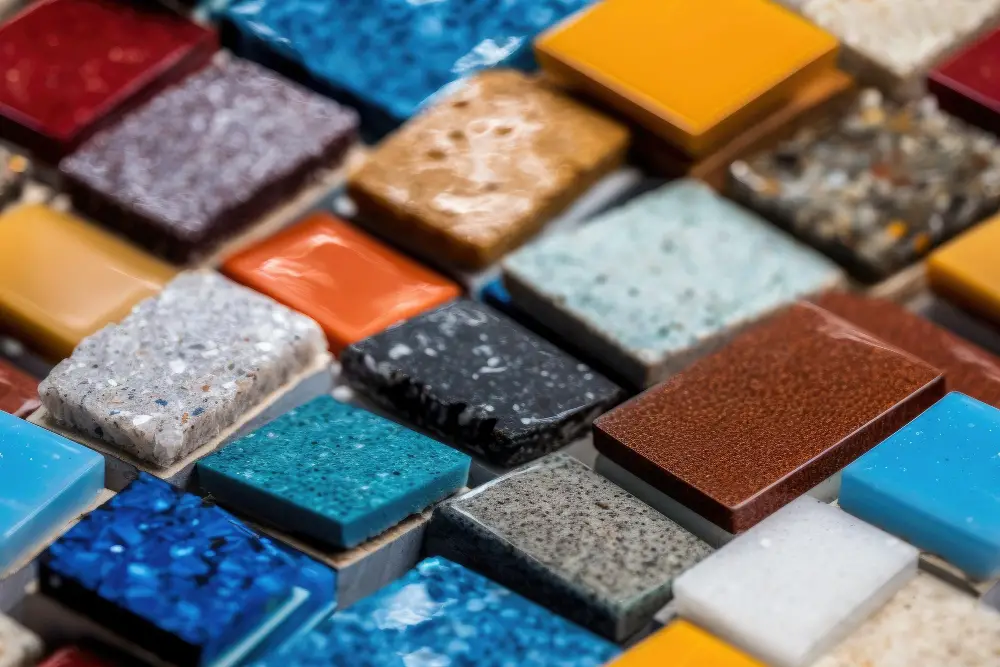
The price of floor tiles varies depending on the type and quality of the material used. Ceramic and porcelain tiles are usually more affordable than natural stone or glass tiles.
Moreover, you can save money by installing them yourself if you have some DIY skills. However, keep in mind that improper installation may lead to costly repairs down the line.
Another advantage of using floor tile for kitchen countertops is that they require minimal maintenance over time which means fewer expenses in cleaning products and professional services.
Installation Process for Floor Tile Countertops
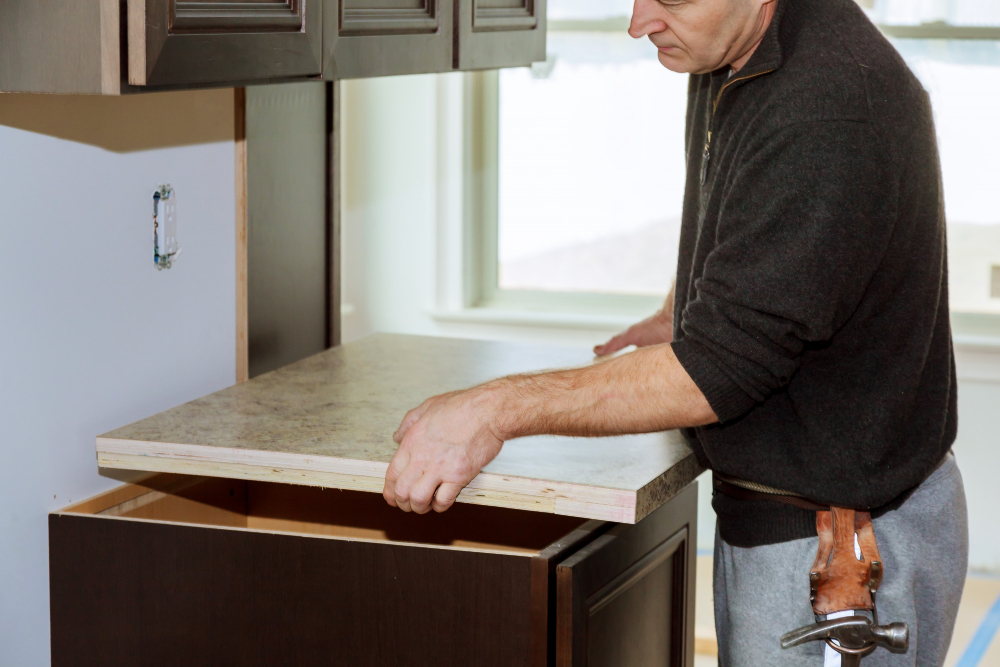
The process of installing tile countertops is similar to that of a tiled floor but requires more precision and attention to detail. It’s important to note that this project can be time-consuming and may require professional help if you’re not confident in your DIY skills.
Firstly, measure the dimensions of your countertop area accurately and purchase enough tiles accordingly with some extra pieces for cuts or replacements. Next, prepare the surface by removing any existing countertop material or debris from the base cabinets.
Afterward, apply a layer of cement board on top of plywood as an underlayment using screws every 6 inches apart around its perimeter. This will provide stability and prevent cracking over time due to weight pressure on top.
Then comes laying out tiles starting from one corner while ensuring they are levelled horizontally using spacers between each tile before applying thin-set mortar underneath them with a trowel evenly spread across their backside.
Once all tiles are laid out correctly according to design plans without any gaps or overlaps between them (cutting where necessary), let it dry overnight before grouting in-between spaces with sanded grout mixed following manufacturer instructions until smooth finish achieved after wiping off excesses carefully using damp sponge/cloth repeatedly until clean surface obtained without scratching glazed surfaces accidentally during cleaning process which could lead later into stains formation if left unattended.
DIY Vs Professional Installation
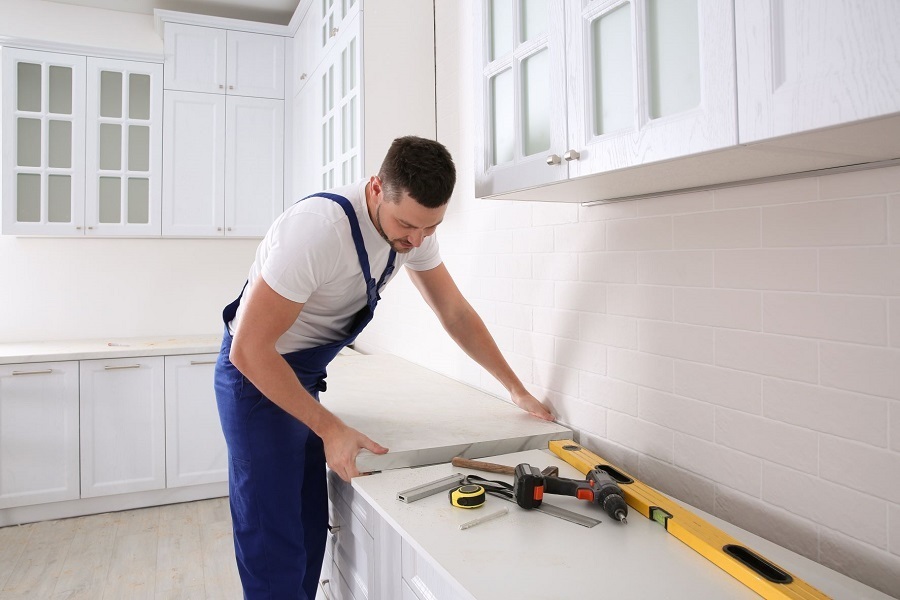
While DIY installation may seem like a cost-effective option, it’s important to weigh the pros and cons before making a decision.
DIY installation can save money on labor costs and give homeowners more control over the design process. However, installing tile countertops requires precision cutting tools and experience with grouting techniques.
If not done correctly, mistakes can be costly in terms of time and money.
On the other hand, hiring a professional installer ensures that your tile countertop will be installed correctly without any issues down the line. Professionals have access to specialized equipment needed for precise cuts as well as knowledge about different types of tiles’ unique properties.
Ultimately, deciding between DIY vs professional installation comes down to personal preference based on skill level and budget constraints.
Customizing Tile Countertops
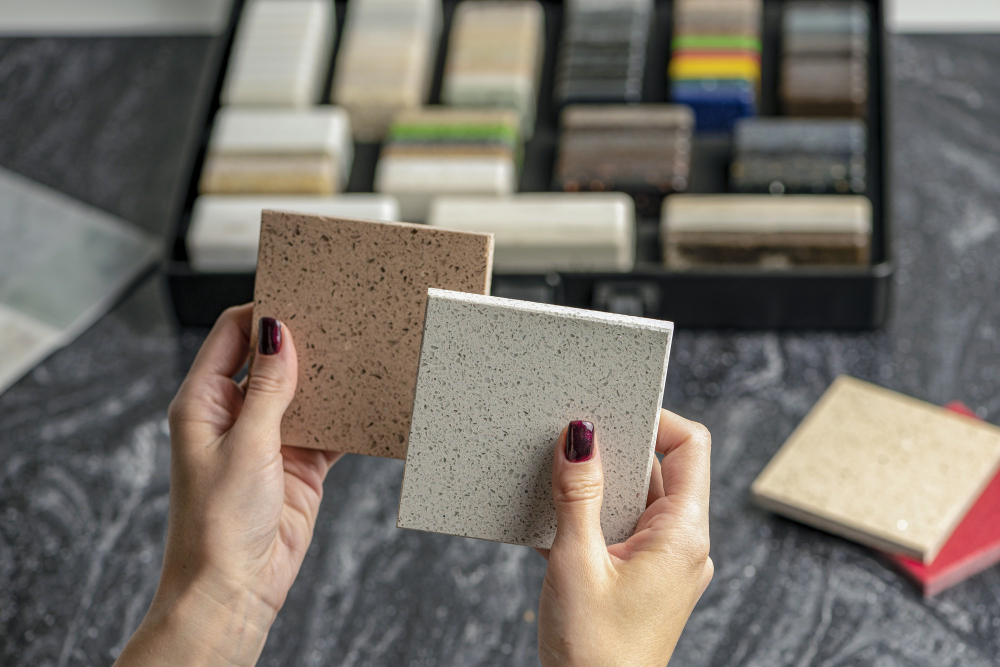
With a wide range of tile sizes, colors, and patterns available in the market, you can create a unique look that complements your kitchen decor.
To add more personality to your tile countertop design, consider mixing and matching different types of tiles or creating mosaic patterns with small pieces. You can also experiment with grout colors and textures to enhance the overall aesthetic appeal.
Another way to customize tile countertops is by adding decorative edge treatments such as bullnose or beveled edges. These options not only provide a finished look but also help protect against chipping or cracking along sharp corners.
Caring for Floor Tile Countertops

Here are some tips on how to maintain and clean your new kitchen surface:.
1. Wipe up spills immediately: While most tiles are resistant to stains, it’s still best practice to wipe up any spills as soon as possible.
2. Use a gentle cleaner: Avoid using harsh chemicals or abrasive cleaners that can damage the tile surface or grout lines.
3. Regularly seal the grout lines: Grout is porous and can absorb liquids easily, leading to discoloration over time if not sealed properly.
4. Avoid placing hot items directly on the countertop: Although many types of tiles have good heat resistance properties, sudden temperature changes may cause cracking or chipping in some materials.
5. Don’t use knives directly on the countertop surface: Sharp objects like knives can scratch certain types of tiles such as glass or ceramic ones; always use a cutting board instead.
Grout Selection and Maintenance
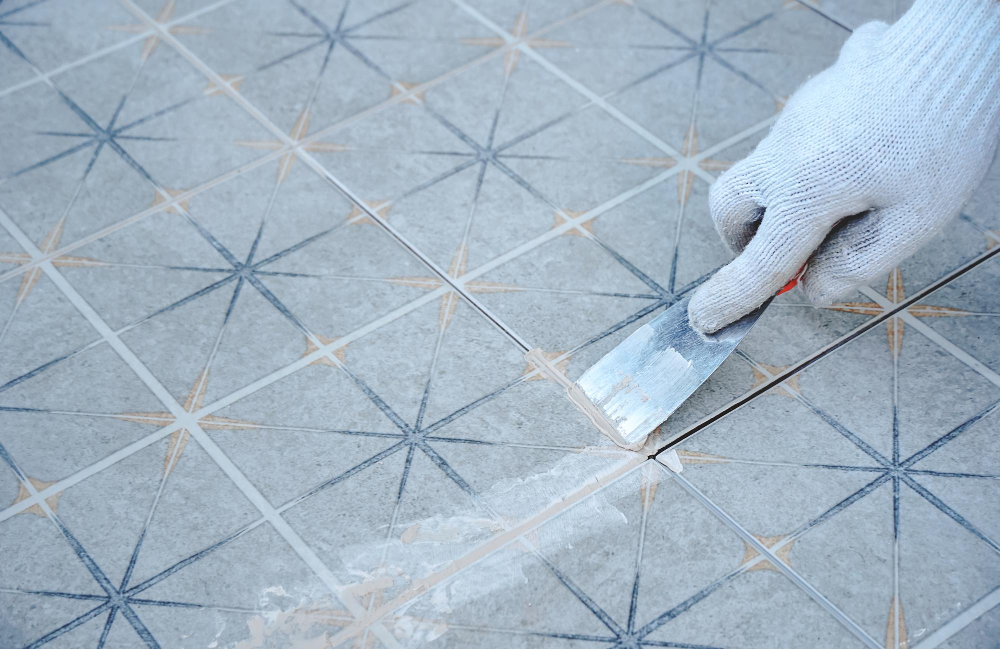
Grout is the material used to fill the gaps between tiles, providing stability and preventing moisture from seeping through. Choosing the right grout color can also enhance or detract from your overall design aesthetic.
For a seamless look, select a grout color that matches your tile closely. If you want to create contrast or highlight certain features of your countertop design, choose a contrasting shade that complements your chosen tile.
Proper maintenance of grouted floor tiles is essential in keeping them looking their best over time. Regular cleaning with mild soap and water will help prevent dirt buildup in between tiles which can cause discoloration over time.
It’s also important to reseal any porous materials such as natural stone on an annual basis since they are more susceptible to staining than other types of flooring materials like porcelain or ceramic.
Easy Replacement of Damaged Tiles
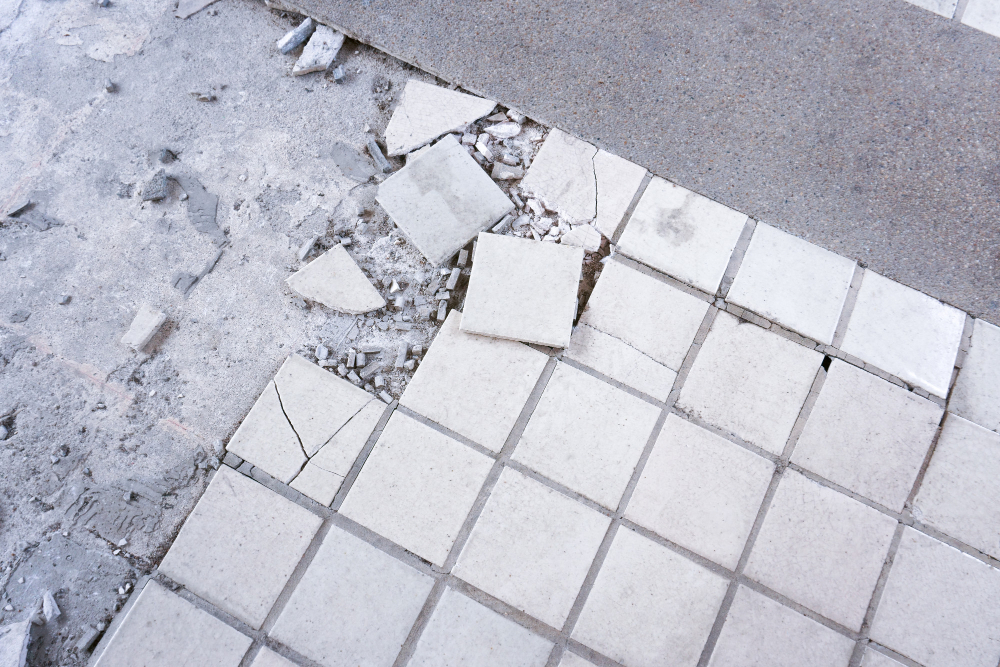
Accidents happen, and sometimes a tile may crack or chip due to heavy use or impact. With traditional countertop materials like granite or quartz, repairing damage can be costly and time-consuming.
However, with floor tile countertops, you can easily remove the damaged tile without disrupting the rest of your countertop surface.
To replace a damaged tile on your kitchen countertop made from floor tiles:.
- Remove any grout around the affected area.
- Use a chisel and hammer to break up the old tile into smaller pieces.
- Carefully remove all debris from under where you will place new tiles.
- Apply adhesive onto an empty space on your counter’s surface where there was once flooring material present before laying down replacement pieces one by one until complete.
Alternative Countertop Materials Comparison

There are several alternative countertop materials that can provide durability, style, and functionality to your cooking space. Some popular options include granite, quartz, marble, concrete or butcher block.
Granite is a natural stone material that offers heat resistance and scratch-resistant properties. It comes in various colors and patterns but requires sealing every few years.
Quartz countertops are made of engineered stone with high durability against scratches or stains while providing an array of color choices.
Marble has been used for centuries due to its timeless beauty; however it’s prone to staining from acidic substances like lemon juice or vinegar which makes maintenance challenging.
Concrete counters offer versatility in design with the ability to customize shapes & sizes while being durable enough for daily use but may require resealing over time.
Butcher block provides warmth & texture along with easy repairability by sanding out any scratches on the surface. When considering different countertop options keep in mind factors such as budget constraints ,maintenance requirements ,and overall aesthetic appeal.
With so many alternatives available you’re sure find one that suits your needs perfectly!
FAQ
Can I use porcelain floor tile as countertop?
Yes, you can use porcelain floor tile as a countertop due to its convenience, resistance, durability, and sophistication.
What is the best type of tile for a kitchen countertop?
The best type of tile for a kitchen countertop is porcelain, as it is durable, stain resistant, and easy to clean.
Can you use any tile for a countertops?
Yes, you can use any tile, any color, and any size for countertops, including tumbled stone, ceramic tile, natural slate, and marble.
Can floor tiles be used as kitchen tiles?
Yes, almost every floor rated tile can be used as kitchen tiles, considering the size and weight of the tile.
Are there any specific advantages or disadvantages to using floor tiles on kitchen countertops?
Using floor tiles on kitchen countertops has advantages, such as durability and cost-effectiveness, but also disadvantages like potential uneven surfaces and difficulty in cleaning grout lines.
How do different materials of floor tiles, like ceramic or marble, perform when used as countertop surfaces?
Ceramic and marble floor tiles as countertop surfaces perform differently; ceramic being more durable and heat resistant while marble being porous and prone to stains.
Is there any significant difference in maintenance and durability when using floor tiles for kitchen countertops compared to traditional countertop materials?
Yes, using floor tiles for kitchen countertops may require more maintenance and have potential durability concerns compared to traditional countertop materials like quartz and granite.
